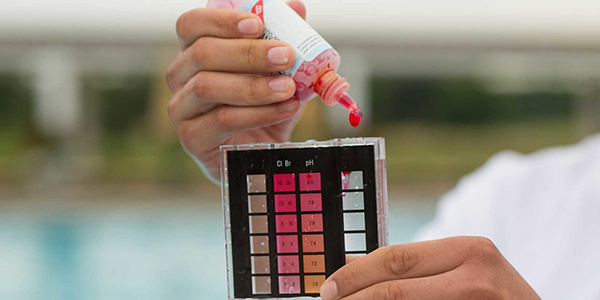Inside Lifeguard Training: Chemical Preparedness and Safety
For what many consider a summer job, lifeguards have a lot more responsibility than expected. Sure, there’s the always-expected attribute of physical fitness, and they have to be ready to rescue at a moment’s notice. But let’s take those qualities away from the equation and … they still have an important, demanding responsibility.
That’s because lifeguards are also responsible for keeping the pool clean and free of debris, harmful microorganisms, and human waste (gross). Chemicals keep homes neat, fruits and vegetables fresh, and our pools safe to use. Without them, a pool is at risk of spreading Recreational Water Illnesses (RWIs) and other waterborne diseases.
It might seem like we’re putting a lot of trust in a young adult. But with the right amount of training and resources, your son or daughter should feel very comfortable handling and managing their facility’s chemical supply. In fact, handling pool chemicals is just part of the job. It’s a perfectly normal duty that all lifeguards should know how to do, which makes your community pool that much safer.
What Your Son or Daughter Will Learn
We require all lifeguards who handle chemicals to complete Chemical Handling training provided by the Occupational Health and Safety Administration. At times, it is possible that your child may be responsible for handling the pool’s chemicals.
Handling common pool chemicals like chlorine and bromine is a common duty for all lifeguards, and it could also be expected of your son or daughter when they become a lifeguard. However, every lifeguard who handles chemicals must also receive pool operations training from our certified experts.
Managing and Adjusting Water Quality
There are a number of factors that go into your pool being safe for a swim. Water quality is, in part, determined by its pH level, which shows how acidic or basic the water is. Too much acid or base in a pool could harm a pool guest’s sensories or skin. At times, it may be necessary for your child to test and manage the water’s chemical levels and pH.
At the very least, every lifeguard should know what their pools’ chemicals do. At times, they may even be asked to assist in testing the pool water chemistry. At the very least, your son or daughter will be expected to identify the physical and chemical properties of these common chemicals and their byproducts:
- Chlorine: A colorless, odorless gas that dissolves in water.
- Free Chlorine: A byproduct of chlorine that cleans and disinfects the pool water.
- Bromine: Often used alongside chlorine to disinfect hot tubs and pools because of its stability in hot temperatures.
- Cyanuric Acid: Stabilizes and protects chlorine from harmful ultraviolet rays that destroy chlorine.
Emergency Action Plans (EAPs)
It’s possible that your son or daughter will need to respond to a situation where guests may be at risk to injury or harm. Chemical emergencies are not regular events, but lifeguards must be ready to respond should they occur. For each hypothetical situation, we have a set of Emergency Action Plans (EAP) tailored specifically to your child’s pool and its staff. Each EAP is specific to each situation, but every lifeguard has a role to play in an emergency. While this list is not exhaustive, here are a few examples of chemical emergencies your son or daughter may prepare for:
- Chemical spills or leaks
- Bodily waste response
- Injury or illness, on land or in water
Each lifeguard is trained by our staff for each situation to:
- Recognize the emergency
- Activate the EAP and alert other pool staff
- Provide emergency care
Your son or daughter may have a great responsibility on their hands, but with proper caution and training, they will have a safe and meaningful job experience.

